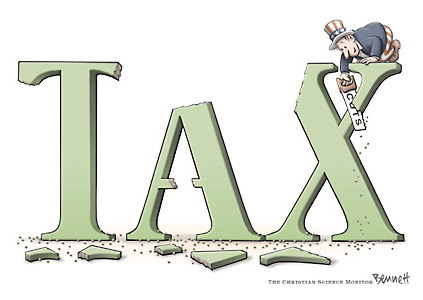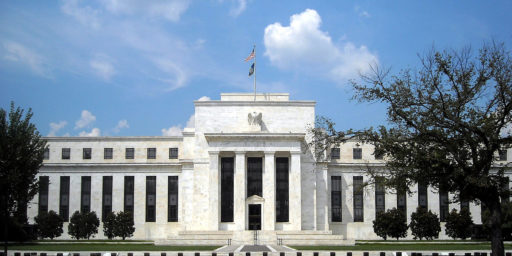Bush Tax Cuts and Clinton Tax Rates
Whenever a Republican mentions the 'Bush tax cuts,' they should also talk about going back to the 'Clinton tax rates.'
Glenn Reynolds passes along this reader input:
READER MARK WILSON WRITES: “Whenever a Republican mentions the ‘Bush tax cuts,’ they should also talk about going back to the ‘Clinton tax rates.’ If we go over the fiscal cliff, make sure people know what they are experiencing are the Clinton tax rates. It’ not too early to start thinking about 2016, when another Clinton may be running for office.”
Oddly, though, President Obama has been doing precisely the same thing for months and, well, got handily re-elected. While there’s a substantial but of post hoc ergo propter hoc going on there, Democrats like to point out that the economy was booming during most of the period when the Clinton tax rates were in effect. After all, it effectively undercuts the Republican argument that raising rates to the pre-cut levels would stifle economic growth.







You’ve got me all nostalgic, James. Too bad we can’t re-inflate the dot-com bubble, too. Good times, good times.
Good Latin reference.
The other pure political points are that most of Zombieland wouldn’t know their own tax rates if their lives were in the balance, and in any event a substantial percentage of Zombieland pays zero net federal income taxes. Plus two of the key hallmarks of the Bush tax cuts are lower rates on capital gains and dividends. Significant percentages of Zombieland couldn’t spell those items correctly, much less grasp their significance.
As far as the Clinton-era tax rates and economic growth are concerned, that does bring up a number of germane and significant questions.
How much of that growth was illusory; merely the byproduct of a historical mania in tech and telecom new issues, VC and loans? How much of that growth was related to the “peace dividend” from the ending of the Cold War? How much of it was derived from Alan Greenspan panicking and dropping the Fed Funds rate after long-term rates unexpectedly spiked in ’94 and early in ’95? What about when Greenspan actually bought into the “Y2K” nonsense and dropped short-term rates again, even though inflation was kicking into gear and “irrational exuberance” already had taken root? Speaking of which, how much of that growth was referable to the giant keg party that erupted on Wall Street, especially after the Feds bailed out Long-Term Capital Management?
Nothing in economics nor in finance is as simple as at first glance it may appear. But even with that caveat you’d have to be cognitively dissonant not to realize that raising taxes during a period of slow and slowing GDP growth and high unemployment is an extraordinarily bad idea.
Hey, here’s a thought – what about going back to the Reagan tax rates? Wouldn’t that make Grover and his pals all squee with delight?
Minor quibble, but in this case it’s a “cum hoc ergo propter hoc”, since the two things being correlated (higher tax rates and rapid economic growth) occured simultaneously rather than one after the other.
@Stormy Dragon: I’ll defer to you on the Latin, since I only know a few phrases. But the nature of the fallacy is attributing based on time sequence. The Clinton Boom came after the Clinton Tax Hikes, so many Democrats attribute to former to the latter, even though there are obviously all manner of other factors, notably the dot.com boom, at work.
@James Joyner:
Correct. Missing from the Democratic narrative is that credit was expanding at the unsustainable rate of 7% per year and that debt was responsible for the “Clinton” Boom.
Considering that Bill Clinton is wildly popular, then yeah, sure. If Republicans want to keep the Clinton name front and center, I say we encourage them.
In my experience, that’s not actually the argument. The argument is “taxes were raised, the GOP screamed that it would crash the economy, but instead it boomed.” It’s not an assertion that the tax increase *caused* the boom. It’s an argument that the tax increase did not prevent the boom, and oh by the way resulted closing the deficit. That, coupled with the results of the Bush tax cuts, makes the overall case against the idea that tax cuts are the solution to every problem and that you simply can’t ever raise taxes or disaster will strike.
I haven’t seen too many people actually arguing that the boom was caused by tax increases. That’s pretty silly. If you like, I will laugh with you at that argument. Haha. Ok, next…
@Rob in CT: I’ve seen both arguments. But even your version of the argument suffers from lack of a counterfactual. That is, it’s quite possible that the boom would have been even greater with lower tax rates. Given how much of it was a function of the tech bubble, though, it’s a silly debate one way or the other: it was a one-off, not an object lesson in how to run an economy.
Why don’t people mention the massive stimulus that we experienced coincidentally with the Clinton presidency: the price of oil declined and stayed down. This was a really big stimulus. Tax rates are one, and only one, factor in economic growth. To say, “Clinton raised taxes and the economy grew, thus the higher tax rates don’t harm economic growth” is ridiculous.
@James Joyner:
It occurs to me that in the context of the modern economy, which is rather less than 50 years old, nearly everything is a “one-off” and therefore there exist very few actually valid object lessons in how to run an economy.
How to test this hypothesis…well, one verifier would be that it appears the people in charge have no idea what they’re doing and are just pulling stuff out of their asses in a vain attempt to figure out what might work.
I think we all know the answer to that one. Hypothesis: confirmed.
@Tsar Nicholas:
“How much of that growth was illusory; merely the byproduct of a historical mania in tech and telecom new issues, VC and loans? How much of that growth was related to the “peace dividend” from the ending of the Cold War? How much of it was derived from Alan Greenspan panicking and dropping the Fed Funds rate after long-term rates unexpectedly spiked in ’94 and early in ’95? ”
Better question: How much of this nonsense do you pull out of your a$$
@Rafer Janders:
On the subject of having things named after you, I’m pretty certain that Obama is very happy with Republicans deciding to call ACA Obamacare, If he had wanted to do that himself, he would never have been able to.
It’s a really nice gift from the GOP to the President. 😀
@James Joyner:
“Post Hoc Ergo Propter Hoc” == “After this, therefore because of this” e.g. I had coffee when I got up and then had an accident on the way to work; coffee causes unsafe driving
“Cum Hoc Ergo Propter Hoc” == “With this, therefore because of this” e.g. I always see people carrying umbrellas on days when it rains; umbrellas cause rain
I guess in this case it depends on whether the “hoc” in question is the act of raising taxes (in which case they occured before the boom) or the continuing state of taxes being higher (in which case the two occured simultaneously).
How much of the stock market bubble was attributable to the cut in the cap gains tax in 1997?
Happy to be of help…
Bingo…I would bet that every single economic boom this country has had within the past 50 years coincided with cheap oil…sadly, cheap oil seems like a thing of the past…
@An Interested Party:
And now it is time to pay the piper the full cost of all that “cheap oil”.
@Ben Wolf:
This is true, much of the growth was a one-off circumstance unlikely to be repeated. But I never ever hear anyone talk about the 80’s boom in term of a historic collapse in oil prices. I mean the savings on expenditures for oil dwarfed the savings in taxes at least 5 to one. The fact is that almost all post ware economic booms mapped to extraordinary events rather then changes in policy which is why I find the “pro-growth” policies being pushed by the GOP as fairy dust.
The only way to fix this is to have everyone take a big haircut, the poor and the middle class have already done that, it’s someone else’s turn now.